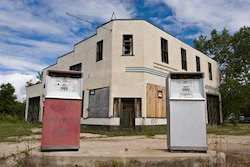I’m feeling a bit nostalgic this first week of 2011 for the days of affordable energy prices, environmentalists who still understood change for the greater good and for a biofuels industry that not only got along but were actually friends.
We’re only four days into the new year and some energy economists have declared that $3.00 per gallon gas prices are the new low and only going up – we’ll never see them lower again.
 Not only are Gas prices going up but energy prices as well – heating oil costs on the East Coast and natural gas costs in the Midwest. Coal is also getting more expensive.
Not only are Gas prices going up but energy prices as well – heating oil costs on the East Coast and natural gas costs in the Midwest. Coal is also getting more expensive.
Yet while we lament about high energy costs, we downright howl over the higher costs of alternative energy and try to push today’s development aside for future progress and cost competitiveness.
Let’s talk about cost parity for a moment. Those opposed to ethanol often cite the cost per gallon is not competitive with gasoline without subsidies unless the price of a gallon of oil reaches a certain point. Hey people – we’re nearing that point and we’ll soon hold steady and never look back.
Several things will happen when the cost of a barrel of oil averages $150 – proof we’ve already seen – America’s energy-based economy begins to collapse. A domestic and global recession ensues. People lose jobs. People lose houses. People can’t afford to pay their energy bills or their food bills.
Yet another thing happens at this point – cost parity. Without subsidies and incentives, and with the advancements in technologies, we suddenly have the ability for domestically produced affordable energy. But we’ll never have this future if we don’t continue to develop alternative energy today.
Yeah, yeah…I know that NO energy source is perfect. Not any form of ethanol, not any form of biodiesel, not wind, solar, or geothermal. Nor is coal, natural gas or petroleum. But used together, they can all be domestically produced and afford our country with the way of life we believe we deserve – one of energy gluttony.
This brings me to my next point. This year, support for biofuels in particular, seems to be at a very-low point, especially in Washington, D.C. despite the one-year extension of the tax credits. This could very well be the last year for “a little help from our government” unless something drastic changes.
Long-time ethanol advocate Sen. Chuck Grassley, R-IA warned the biofuels industry in a Des Moines Register article just before the new year, “We can’t stand any more division within biofuels.” [I also cautioned this last year in my Between the Lines post, “Ethanella – A Fairy Tale.”]
In the face of growing opposition, Grassley cautioned the industry that divided they will fall.
“When it was Big Oil fighting biofuels, I don’t think there was a problem. But when you have Big Oil, Big Food, environmental groups, some ag groups up against biofuels, it’s pretty common sense that you can’t have much division in biofuels or you’re in trouble. Or in more trouble, I should say,” Grassley said.
This year is probably the most critical juncture the industry has ever faced, and to get by we will definitely need a “Little Help From My Friends” as the Beatles and Joe Cocker once crooned. Quite frankly, if we want a future of energy prosperity, then we can’t lose our biofuels industry (or our alternative energy industry in general). And friends the biofuels industry has – maybe too many. In fact, just this week, a new group, American Biofuels Now, just launched to promote renewable energy including biofuels. So how many are there? Link here to download a list. Today, there are arguably more than two dozen national biofuel and agricultural associations and another dozen or more state groups dedicated to promoting ethanol and biodiesel.

All of these groups have different agendas, overlapping members and are vying for the same pot of money; yet they have the same core messages. But when these different groups invade the Hill, their goals for biofuels appear divided, frustrating policy makers and slowing efforts. So if you take Grassley’s message to heart, now is the time to work together for the greater good.
Today that greater good is to ensure that we will have domestically produced affordable energy in the wake of rising fossil-fuel based energy costs.

